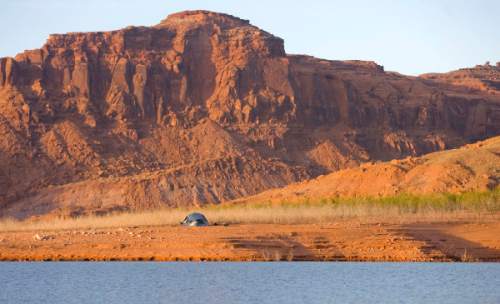This is an archived article that was published on sltrib.com in 2016, and information in the article may be outdated. It is provided only for personal research purposes and may not be reprinted.
A controversial bill with the potential to fund unpopular water projects like the Lake Powell Pipeline has secured legislative approval from both the House and Senate.
SB80 was originally designed to create a special water infrastructure fund and divert a 1/16-cent sales tax to it, but was amended on Wednesday to send a portion of the sales tax to the general fund for education. The substitute bill passed 46-26 after a nearly hour-long debate in which many representatives questioned the bill's transparency, necessity and timing.
"I think we're ahead of ourselves right now," Rep. Joel Briscoe, D-Salt Lake City, said before voting against the bill. "I do not believe that it is now or never."
Briscoe urged the House to vote down bill, which he said would save hundreds of millions of dollars for water projects the state hasn't committed to build. Others agreed, raising concerns about the reliability of the data used by the state to project the need for water development, and about the long-term environmental impacts those development projects might have on the Great Salt Lake.
But the bulk of their concerns revolved around questions of how the money in the water infrastructure fund would be appropriated.
"We're going to stop up this money and then wait ... for back room deals," said Rep. Dan McCay, R-Riverton, who also voted against the bill. "That's the way we used to do transportation. I do think we need funding, yes, but there is no criteria for how we are going to award these projects. For that reason — if there were a motion for worry, I think I'd make one."
Rep. Melvin Brown, R-Coalville, voted in favor of the bill but questioned whether re-appropriating tax dollars was appropriate.
"Last year we stood here hat in hand, begging the population to support our motor tax increase," he said. "Now we're here a year later, saying we didn't need that much."
Those who spoke in favor of the bill argued that SB80 took a long view of the future and could stave off water shortages and to prevent downstream states from claiming Utah's portion of the Colorado River.
The amendment to send money to education also became a selling point.
"This is about our children, and our grandchildren, having the opportunity we have because our grandparents thought about water and our needs," said Rep. Scott Sandall, R-Tremonton. Randall voted to support the bill.
Outside critics, however, were skeptical of claims that the state faces an impending water crisis, pointing to state's water performance audit, which last spring concluded that Utah should come into a surplus water supply as farmland is converted to more urban uses.
They also questioned claims that the water infrastructure fund is intended to help repair and maintain existing water infrastructure.
"This bill has passed on an elaborate misinformation campaign of fear-mongering and special interest money," said Zach Frankel, executive director of the Utah Rivers Council.
Ron Thompson, general manger of the Washington County Water Conservancy District, said he thought SB80 was a balanced bill that involved a lot of compromise and "set a good example of how legislation happens."
But it could be some time before his district makes use of the water infrastructure fund. The district has been setting aside money for aging infrastructure and should be able to afford the necessary upgrades on its own, he said.
It's big development projects such as the Lake Powell Pipeline that need help getting started, he said.
Even then, Thompson said, the Lake Powell Pipeline still needs to obtain environmental permits before the district considers how it might use the water infrastructure fund to help pay for the Lake Powell Pipeline — and that date, he said, is still several years off.
A sister bill, SB251, was discussed later on Wednesday in response to concerns that the disbursal of water funds would lack oversight. SB251 would give the Board of Water Resources, the Division of Water Resources, and the State Water Development Commission the authority to make rules regarding the funding of water infrastructure projects and instructs those bodies to establish criteria for better water data and data reporting, set water conservation targets, pursue independent review of proposed projects, set the terms of repayment plans and solicit public feedback. The bill passed after a lengthy debate with a vote of 60-14.
Twitter: @EmaPen



